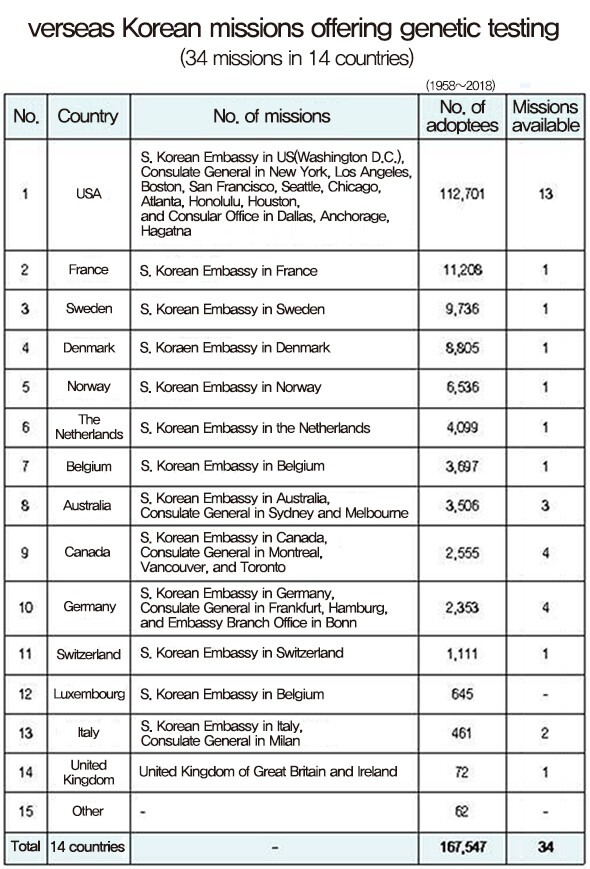hankyoreh
Links to other country sites 다른 나라 사이트 링크
Korean adoptees can submit DNA to Korean overseas missions in family search
Korean adoptees living overseas are now able to submit a DNA sample at a South Korean foreign mission in an effort to locate their family. Previously, they’d been required to travel to Korea and visit a police station if they wanted to run a DNA search for their family.
South Korea’s National Police Agency, Ministry of Foreign Affairs, and Ministry of Health and Welfare announced on Dec. 19 that they would be launching a service on Jan. 1, 2020 through which Koreans adopted overseas as children can submit and register their DNA at foreign diplomatic offices if they’d like to find their family.

According to the National Police Agency and others, overseas Korean adoptees who submit an adoption information disclosure request with the National Center for the Rights of the Child (NCRC), and who receive written confirmation that no remaining information exists regarding their biological parents, may make an appointment with one of 34 overseas government agencies in 14 countries to undergo genetic testing. These overseas adoptees with no access to information on their biological parents are eligible for genetic testing as “children without family or friends” under the Act on the Protection and Support of Missing Children, etc. In some cases, they may have been adopted overseas without consent from their biological parents due to circumstances including disappearance. In the past 60 years, around 170,000 South Korean children were adopted by parents in 14 countries. In an estimated 30,000 of those cases, no remaining information exists on their biological parents.
Once collected at an overseas government office, DNA samples are submitted to the NPA via diplomatic pouch. If testing confirms a match with genetic information for missing family members, a second confirmation is performed and reunion procedures are carried out with the NCRC’s support.
“Finding missing persons is an issue all of us need to be joining forces to resolve, and we look forward to being able to find more long-term missing children with the cooperation of related agencies,” said NPA Commissioner General Min Gap-ryong.
“We will continue to search for diverse and effective ways of locating family members of long-term missing persons,” Min said.
By Jung Hwan-bong, staff reporter
Please direct comments or questions to [english@hani.co.kr]

Editorial・opinion
![[Column] Has Korea, too, crossed the Rubicon on China? [Column] Has Korea, too, crossed the Rubicon on China?](https://flexible.img.hani.co.kr/flexible/normal/500/300/imgdb/original/2024/0419/9317135153409185.jpg) [Column] Has Korea, too, crossed the Rubicon on China?
[Column] Has Korea, too, crossed the Rubicon on China?![[Correspondent’s column] In Japan’s alliance with US, echoes of its past alliances with UK [Correspondent’s column] In Japan’s alliance with US, echoes of its past alliances with UK](https://flexible.img.hani.co.kr/flexible/normal/500/300/imgdb/original/2024/0419/2317135166563519.jpg) [Correspondent’s column] In Japan’s alliance with US, echoes of its past alliances with UK
[Correspondent’s column] In Japan’s alliance with US, echoes of its past alliances with UK- [Editorial] Does Yoon think the Korean public is wrong?
- [Editorial] As it bolsters its alliance with US, Japan must be accountable for past
- [Guest essay] Amending the Constitution is Yoon’s key to leaving office in public’s good graces
- [Editorial] 10 years on, lessons of Sewol tragedy must never be forgotten
- [Column] A death blow to Korea’s prosecutor politics
- [Correspondent’s column] The US and the end of Japanese pacifism
- [Guest essay] How Korea turned its trainee doctors into monsters
- [Guest essay] As someone who helped forge Seoul-Moscow ties, their status today troubles me
Most viewed articles
- 1[Column] The clock is ticking for Korea’s first lady
- 2After 2 months of delayed, denied medical care, Koreans worry worst may be yet to come
- 3[Column] Has Korea, too, crossed the Rubicon on China?
- 4[Correspondent’s column] In Japan’s alliance with US, echoes of its past alliances with UK
- 5Samsung barricades office as unionized workers strike for better conditions
- 6All eyes on Xiaomi after it pulls off EV that Apple couldn’t
- 7US overtakes China as Korea’s top export market, prompting trade sanction jitters
- 8Hong Se-hwa, voice for tolerance whose memoir of exile touched a chord, dies at 76
- 9[Photo] Smile ambassador, you’re on camera
- 10[Editorial] When the choice is kids or career, Korea will never overcome birth rate woes